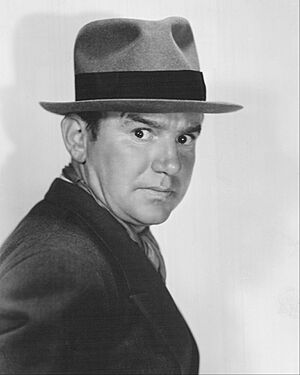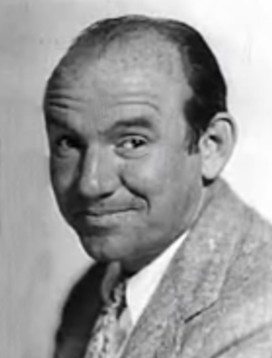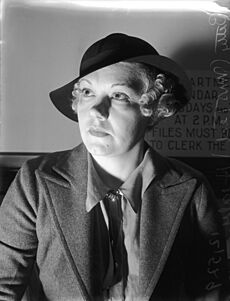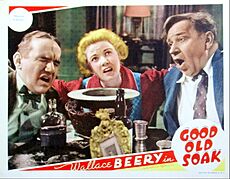Ted Healy facts for kids
Quick facts for kids
Ted Healy
|
|
|---|---|

Healy in 1937
|
|
| Born |
Charles Ernest Lee Nash
October 1, 1896 Kaufman, Texas, U.S.
|
| Died | December 21, 1937 (aged 41) Los Angeles, California, U.S.
|
| Resting place | Calvary Cemetery, East Los Angeles |
| Nationality | American |
| Occupation | Comedian, actor |
| Years active | 1912–1937 |
| Spouse(s) |
Betty Brown
(m. 1922; div. 1932)Betty Hickman
(m. 1936) |
| Children | 1 |
Ted Healy (born Charles Ernest Lee Nash; October 1, 1896 – December 21, 1937) was an American vaudeville performer, comedian, and actor. He is best known for creating The Three Stooges and their famous style of slapstick comedy. However, he also had a very successful career on stage and in movies. Many later comedy stars said he greatly influenced their work.
Contents
Early Life and First Steps
Ted Healy was born Ernest Lea Nash on October 1, 1896, in Kaufman, Texas. His parents were Charles McKinney Nash and Mary Eugenia Nash. He went to Holy Innocents School in Houston. In 1908, his family, including his older sister Elizabeth, moved to New York. Elizabeth later became an actress named Marcia Healy. Ted went to high school at De La Salle Institute. He first wanted to be a businessman, but he soon decided to become a performer instead.
Starting a Show Business Career
Ted Healy began his show business journey in 1912 when he was just 15. He and his childhood friend, Moe Howard, joined a vaudeville act called the Annette Kellerman Diving Girls. This act also included four boys. The show ended quickly after an accident on stage. After that, Ted and Moe went their separate ways for a while.
Ted Nash then created his own vaudeville act and started using the stage name Ted Healy. His act became very popular. He soon became a well-known comedian and a master of ceremonies (MC). In the 1920s, he was one of the highest-paid performers in vaudeville. He even added other performers to his stage show, including his wife, Betty Brown, and his German shepherd dog.
How the Stooges Began
Ted and Betty's show was called Syncopated Toes. In late 1923, some of their acrobats left the show. Moe Howard saw an advertisement for replacements and joined the act. Moe was not an acrobat, so Ted gave his old friend a new role: a stooge. A stooge was someone who pretended to be a random audience member chosen to come on stage. In their act, Moe's appearance would often end with Ted losing his trousers, which was very funny to the audience.
Moe's brother, Shemp, joined the act in early 1924. He played a "heckler," someone who would playfully interrupt the show. Both Moe and Shemp left show business for a short time in mid-1925. Ted and Betty Healy then starred in a Broadway show called Earl Carroll Vanities of 1925. Ted used some of the comedy ideas he had developed with the Howard brothers.
Ted Healy and His Comedy Teams
Shemp Howard returned to Ted's act in January 1926. They toured the country successfully. Ted and Betty then got another chance on Broadway in The Passing Show of 1926. This show did not open on Broadway, but it was changed into a successful show called A Night in Spain. For this show, Ted used four stooges in some scenes. In March 1928, Larry Fine joined Ted's group of comedians. Larry had been working as a performer and MC at a nightclub in Chicago.
Ted was then hired to star in a new show called A Night in Venice. Moe Howard returned to show business and helped Ted create new comedy bits for the show. Shemp Howard also came back. Larry Fine joined the cast of Venice a little later.
During the show A Night in Spain, Ted and Betty also performed a song-and-dance act in nightclubs. However, Ted and Betty separated in 1928. Ted then had the idea to create a new act that focused on his stooges, with lots of comedy and slapstick humor. While performing in Venice, Ted also booked his group in other shows. They were called "Ted Healy & His Southern Gentlemen" and later "Ted Healy & His Racketeers". A Night in Venice closed in March 1930.
Fox Films hired Ted Healy to star in the movie Soup to Nuts in 1930. Ted brought Moe, Shemp, Larry, and Fred Sanborn with him. In late August 1930, the Stooges and Ted Healy went their separate ways after a disagreement about a movie contract. The three remaining Stooges began performing on their own. They used names like "The Three Lost Soles" and "Howard, Fine, and Howard." Ted tried to sue them for using his comedy material, but the Stooges had permission from the company that owned the routines.
Ted Healy hired new stooges in early 1931. This new group appeared with him in two Broadway plays. Moe, Larry, and Shemp rejoined Ted's act in July 1932. However, Shemp left again in August to start his own career. He was replaced by his younger brother, Curly Howard. The change happened very quickly. On August 27, 1932, just eight days after Shemp left, "Ted Healy with Howard, Fine & Howard" introduced Curly in Cleveland, Ohio. This new group performed in many popular nightclubs and movie theaters across the country.
In spring 1933, Ted signed a contract with MGM, a big movie studio. The group moved to Hollywood for good. Over the next year, Ted's comedy team appeared in several short films for MGM. They also supported famous stars like Clark Gable and Joan Crawford in movies like Dancing Lady. Ted Healy also had important roles in MGM movies like Bombshell and Operator 13. In March 1934, Larry and the Howards decided to leave Ted Healy's act. They started working at Columbia Studios as "The Three Stooges."
Ted Healy's Solo Film Career
After the Stooges left, Ted Healy continued to appear in many films for MGM from 1934 to 1937. He also worked for other studios like 20th Century-Fox and Warner Bros.. He played both serious and funny roles. In one of his films, Mad Holiday (1936), his sidekick was Dick Hakins, one of his earlier stooges. In the movie San Francisco (1936), a new group of "stooges" filmed a scene with Healy, but it was not included in the final movie. Ted Healy wore a toupée (a wig) in public during this time. His last film, Hollywood Hotel (1937), was released just a few days after he passed away.
Personal Life
Ted Healy's first wife was a dancer and singer named Betty Brown. They got married in 1922, just one week after they met. The couple worked together in vaudeville. They divorced in 1932.
Ted's second marriage was to Betty Hickman, a college student. They met, and Ted proposed the very next day! They got married in Yuma, Arizona, on May 15, 1936. Betty Hickman filed for divorce in October 1936, but they got back together. Their son, John Jacob, was born on December 17, 1937, just four days before Ted Healy's death.
Passing Away
Ted Healy passed away on December 21, 1937, when he was 41 years old. He had been celebrating at a nightclub in Los Angeles. According to Moe Howard, Ted was very happy about the birth of his son.
Friends and colleagues set up a special fund to help Betty and her child financially. A fundraiser was also held, but Betty later said she never received any money from it. Ted Healy is buried at Calvary Cemetery in Los Angeles, California, with his mother and sister.
His Lasting Legacy
Many famous comedy stars who came after Ted Healy said he was a great teacher and a big influence on their careers. These stars included Milton Berle, Bob Hope, and Red Skelton. Milton Berle once said that Ted Healy gave him great advice in 1925: "Always play to the public. Don't try to impress the musicians in the orchestra pit. Entertain the people, and you'll get rich and famous." A funny drawing of Ted Healy by Alex Gard was the first of many drawings displayed at Sardi's restaurant in New York City's Theater District.
Filmography
| Year | Title | Role | Notes |
|---|---|---|---|
| 1926 | Wise Guys Prefer Brunettes | Napoleon Fizz | Short film |
| 1930 | Soup to Nuts | Ted "Teddy" | |
| 1931 | A Night in Venice | ||
| 1933 | Nertsery Rhymes | Papa | Short film Story |
| 1933 | Stop, Sadie, Stop | Ted | Short film. A lost film |
| 1933 | Beer and Pretzels | Himself | Short film Writer |
| 1933 | Hello Pop! | Father | Short film Writer |
| 1933 | Stage Mother | Ralph Martin | |
| 1933 | Bombshell | Junior Burns | |
| 1933 | Plane Nuts | Himself | Short film Writer |
| 1933 | Meet the Baron | Head Janitor | |
| 1933 | Dancing Lady | Steve - Patch's Assistant | |
| 1933 | Myrt and Marge | Mullins | |
| 1934 | Fugitive Lovers | Hector Withington, Jr. | |
| 1934 | Lazy River | William "Gabby" Stone | |
| 1934 | The Big Idea | Ted Healy, Scenario Company President | Short film Writer |
| 1934 | Hollywood Party | Reporter | Uncredited; last film with the Stooges |
| 1934 | Operator 13 | Doctor Hitchcock | |
| 1934 | Paris Interlude | Jimmy | |
| 1934 | Death on the Diamond | 'Truck' Hogan | |
| 1934 | The Band Plays On | Joe O'Brien | |
| 1934 | Forsaking All Others | (scenes deleted) | |
| 1935 | The Winning Ticket | Eddie Dugan | |
| 1935 | The Casino Murder Case | Police Sergeant Ernest Heath | |
| 1935 | Reckless | Smiley | |
| 1935 | Murder in the Fleet | Gabby O'Neill | |
| 1935 | La Fiesta de Santa Barbara | Himself | Color short film |
| 1935 | Mad Love | Reagan | |
| 1935 | Here Comes the Band | Happy | |
| 1935 | It's in the Air | Clip McGurk | |
| 1936 | Speed | Clarence Maxmillian "Gadget" Haggerty | |
| 1936 | San Francisco | Mat | |
| 1936 | Sing, Baby, Sing | Al Craven | |
| 1936 | The Longest Night | Police Sergeant Magee | |
| 1936 | Mad Holiday | Mert Morgan | |
| 1937 | Man of the People | Joe The Glut | |
| 1937 | The Good Old Soak | Al Simmons | |
| 1937 | Varsity Show | William Williams | |
| 1937 | Hollywood Hotel | Fuzzy Boyle | |
| 1938 | Love Is a Headache | Jimmy Slattery | |
| 1938 | Of Human Hearts | Uncredited |
 | Percy Lavon Julian |
 | Katherine Johnson |
 | George Washington Carver |
 | Annie Easley |




